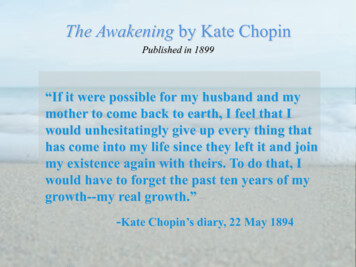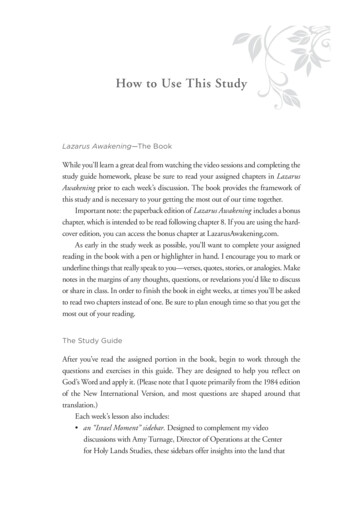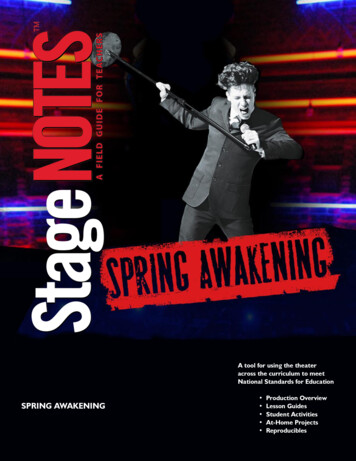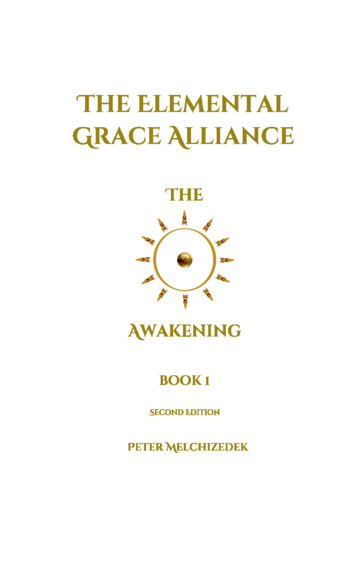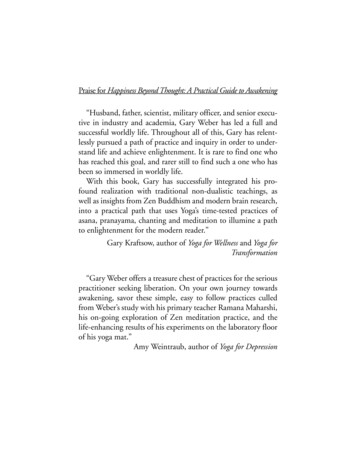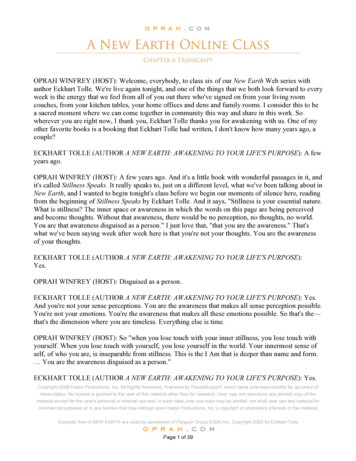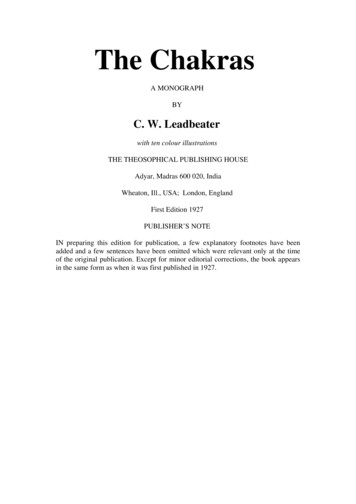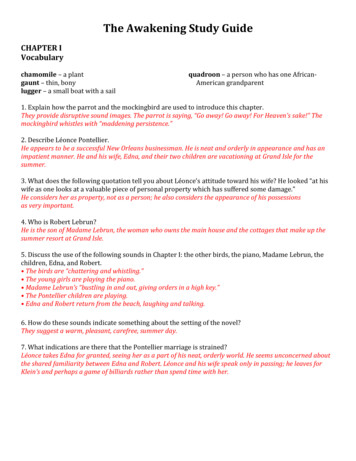
Transcription
The Awakening Study GuideCHAPTER IVocabularychamomile – a plantgaunt – thin, bonylugger – a small boat with a sailquadroon – a person who has one AfricanAmerican grandparent1. Explain how the parrot and the mockingbird are used to introduce this chapter.They provide disruptive sound images. The parrot is saying, “Go away! Go away! For Heaven’s sake!” Themockingbird whistles with “maddening persistence.”2. Describe Léonce Pontellier.He appears to be a successful New Orleans businessman. He is neat and orderly in appearance and has animpatient manner. He and his wife, Edna, and their two children are vacationing at Grand Isle for thesummer.3. What does the following quotation tell you about Léonce’s attitude toward his wife? He looked “at hiswife as one looks at a valuable piece of personal property which has suffered some damage.”He considers her as property, not as a person; he also considers the appearance of his possessionsas very important.4. Who is Robert Lebrun?He is the son of Madame Lebrun, the woman who owns the main house and the cottages that make up thesummer resort at Grand Isle.5. Discuss the use of the following sounds in Chapter I: the other birds, the piano, Madame Lebrun, thechildren, Edna, and Robert. The birds are “chattering and whistling.” The young girls are playing the piano. Madame Lebrun’s “bustling in and out, giving orders in a high key.” The Pontellier children are playing. Edna and Robert return from the beach, laughing and talking.6. How do these sounds indicate something about the setting of the novel?They suggest a warm, pleasant, carefree, summer day.7. What indications are there that the Pontellier marriage is strained?Léonce takes Edna for granted, seeing her as a part of his neat, orderly world. He seems unconcerned aboutthe shared familiarity between Edna and Robert. Léonce and his wife speak only in passing; he leaves forKlein’s and perhaps a game of billiards rather than spend time with her.
CHAPTER IIVocabularycountenance – the look on a person’s faceincessantly – never stoppinginfusion – the act of putting or mixing one thinginto anotherlanguor – listlessness, a lack of vitality1. Describe Edna Pontellier.She is attractive, handsome rather than beautiful. Her eyes are “quick and bright; they were a yellowishbrown, about the color of her hair.2. What kind of person is Robert Lebrun?He is a clerk in a mercantile house who has hopes of finding his fortune in Mexico. This has not happened yet,but he has plans to meet someone in Mexico who may help him in this goal.3. What shift in point of view is evident in Chapter Two?The shift is from Mr. Pontellier’s to the author’s third-person point-of-view. Chopin comments here on theconversation between Edna and Robert.4. What do you learn about Robert and Edna from their conversation at the end of this chapter?Left alone when Léonce does not return early, Edna and Robert talk in a leisurely, unhurried manner. He isconcerned about his future; she talks about her childhood homes, her sisters, and her dead mother.CHAPTER IIIVocabularycomposure – the state of being calmdispelling – causing to vanishforegoing – that which came beforehabitual – much seen or done, usualimpaired – damagedimploring – beggingindiscriminately – done haphazardlylamenting – regretting, feeling deep sorrowluscious – delicious, sweetmonotonous – tiresome; unvaryingmournful – sadoppression – burden, a feeling of being weigheddowntoothsome – pleasing to the tasteupbraiding – scolding1. How does Léonce’s behavior when he returns from the Klein Hotel reveal his attitude toward his wife?He returns at 11:00 in a good mood. He is inconsiderate and disturbs Edna by talking to her, even though shehas been sleeping. He seems wrapped up in his own concerns and ignorant of his wife’s needs. He refers toher as “the sole object of his existence,” but she is treated only as an object, not a person. He scolds her fornot taking care of the children, which he feels is her job, even though he has forgotten to bring them thepromised treats.2. What shows the reader more signs of the marital conflict between the Pontelliers?Edna is upset by her husband’s criticism. After checking on the children, she goes outside and cries for sometime while her husband sleeps. She cannot explain to herself exactly why she is crying.
3. Discuss how sounds are used as a backdrop to the scene of disagreement between Léonce and Edna.How is the sea used as a symbol?There is the hooting of an owl and the “everlasting voice of the sea” that seems like “a mournful lullaby uponthe night.” The sea is a symbol for Edna’s awakening from her present life to a different existence. The sea isa little louder than it has ever been before.4. How does the gift Edna receives from her husband symbolize her marriage and most marriages of thistime?The gifts look good and taste good, but they are trivial and quickly gone. Most marriages at this time, likethe Pontelliers’, look good on the outside but do not necessarily have much depth or substance.CHAPTER IVVocabularyamicable – friendlyample – more than enoughanticipating – expectingatonement – to right a wrong, to make amendsbodice – a vestCreole – a person descended from the originalFrench settlers of Louisianadroll – oddly amusingefface – to make unimportant, to wipe outembodiment – the perfect exampleesteemed – to have great regard forimpervious – incapable of being hurtinsidious – more dangerousiota – a very small amountsubsequent – that which follows1. Describe the unusual nature of the relationship between Edna and her children.There is no outward display of affection. She “was not a mother/woman.” The children take care ofthemselves with some help from a nurse.2. What satiric comment does the narrator make concerning “mother-woman”? Cite specific words thatreveal the satiric nature of these comments.“They were women who idolized their children, worshiped their husbands, and esteemed it a holy privilege toefface themselves as individuals and grow wings as ministering angels.” Chopin also uses words such asfluttering, protecting, and precious brood.3. Who is Adéle Ratignolle, and how is she the embodiment of the “mother-woman”?She is an acquaintance of Edna’s; they spend time together sewing and visiting. She is the antithesis of Edna:she is openly affectionate with her children, lavishing both her children and her husband with total love. Shehas three children and is planning for a fourth.4. How does the fact that Edna is not a Creole affect her relationship with others on Grand Isle?She feels set apart from the “one large family” of Creoles on Grand Isle that summer. She feels uncomfortablewhen they openly discuss and tell stories about what she has always considered “inappropriate” topics.5. Support the following statement as a possible theme in the novel: there is danger in novels that canconfuse susceptible women.Edna is given a somewhat shocking, scandalous novel to read. The others read it openly and discuss it. She“read the book in secret and solitude.” Books of this kind may stimulate the romantic thoughts of avulnerable person such as Edna Pontellier.
CHAPTER VVocabularyaptitude – talentcongenial – agreeable; sharing common tastesand interestscontemptuous – scornfuldetain – keep from leavingearnest – genuineentreaty – requestimperative – powerful; importantinconsolable – unable to be calmednaivete – extreme innocence, foolish simplicityprostrating – knellingremonstrate – to make objectionssensuous – that which stimulates the sensessonorous – full, deep, rich soundvouchsafe – bestow, give, grant1. During the Middle Ages, courtly love was embodied in the behavior of a knight toward the fine lady heloved. He would prostrate himself before her, idealize her, carry her favor into battle, but neverdemonstrate physical love for her. How does Robert’s behavior toward Edna fit this pattern?Robert has exhibited such behavior toward women in the past; one summer he was hopelessly “in love” withAdéle Ratignolle. When he devotes himself to Edna by waiting on her and “exchanging occasional words,glances or smiles,” there appears to be an “advanced stage of intimacy” developing.2. What is the difference between Robert’s present attentions to Edna and his past attentions to AdéleRatignolle?Adéle, and the other Creole women on Grand Isle, knew “the game,” and did not take Robert seriously. Edna,however, feels uncomfortable when Robert leans his head on her arm, not once but twice. She does take hisactions seriously.3. What is the significance of Edna’s sketching in this chapter?Edna sketches as a hobby; other women do not indulge in such creative pastimes. Their efforts are devotedto their children. Her sketching is a casual diversion from which she derives some personal satisfaction.CHAPTER VIVocabularyabysses – immeasurably deep spacesponderous – difficult to handle1. What question does Robert pose to Edna after Madame Ratignolle leaves? Why does this question posea problem for Edna?He asks her if she is going to bathe (swim). At first she declines; then she walks with him to the beach. She isconfused by this contradiction. She is “beginning to realize her position in the universe as a human being,and to recognize her relations as an individual to the world within and about her.”2. How is the sea used symbolically in this chapter?The sea is “whispering, clamoring, murmuring, inviting the soul to wander for a spell in abysses of solitude;to lose itself in mazes of inward contemplation.” The sea is a symbol of Edna’s awakening. “The voice of thesea speaks to the soul,” and Edna is beginning to respond to this voice inside her.
Chapter VIIVocabularyacme – the highest pointcandor – frankness, honestydecrees – events that seem foreordainedeffusive – expressing great emotionenamored – feeling love forhitherto – until nowinduce – persuadeintoxicated – excitedmanifestation – an expression ofpropensity – an inclinationrelinquish – to give up1. How are Edna Pontellier and Adéle Ratignolle contrasted in this chapter?Edna is reserved and solitary while Adéle is open, candid, and very friendly. Edna seems unsure of her lifenow while Adéle is perfectly happy with her children and her husband.2. How is the road to the beach used symbolically in this chapter?The road to the beach is “a long, sandy path” bordered by “sporadic and tangled growth,” much like Edna’sdifficult path to awakening. The path that leads to the sea, is a symbol of Edna’s awakening.3. How are the lady in black and the two lovers used symbolically in this chapter?These three characters recur throughout the novel. The two lovers symbolize how lovers are intent upononly themselves to the exclusion of others. The lady in black could be death, or she could be a moralconscience that follows and watches the lovers.4. How is the flashback to Edna’s childhood used to show the reader how Edna has been repressed andlonely all her life?She has formed no close friendships within or outside her family. Since childhood, she has been repressed bystrict religious influences.5. What do you learn about Edna as a person, given the reasons for her marriage to Léonce?She has had romantic fantasies of men and love but has always been disappointed in some way. She entersinto marriage with no illusions about love and with a practical understanding of the marriage. She marriesLéonce partly because her family objects. Edna does have a rebellious streak, but her marriage to LéoncePontellier is a practical decision that will put an end to foolish, romantic dreams and fantasies. She mustwalk this path forever “idly, aimlessly, unthinking and unguided.”6. “She grew fond of her husband, realizing with some unaccountable satisfaction that no trace of passionor excessive and fictitious warmth colored her affection, thereby threatening its dissolution.” How doesthis omniscience of Chopin reveal Edna’s feelings about marriage and intimate relationships?Affection is more lasting than passion; passion can destroy affection. Edna marries someone who will notconfuse her emotionally. This summer on Grand Isle, Edna feels dangerous emotions beginning to surface;the fact that she is married does not seem to be an obstacle to her exploring these emotions.7. How does Edna feel toward her children? What does she realize about herself and her role as a mother?She is erratic, sometimes embracing them, at other times ignoring them. She realizes that it is her fate to bea mother, even though she is not particularly good at it.
8. How is the theme of “awakening” revealed in this chapter?Edna talks openly and freely to Adéle, something she has never done before. To her it is like “a first breath offreedom.” She feels “flushed” and “intoxicated with the sound of her own voice.”9. How is the symbolism of the unknown “lovers” used in this chapter?They symbolize passionate love, totally involved with only each other. They are seen now only in thebackground, representing Edna’s hidden desires contrasted to her stagnant marriage.CHAPTER VIIIVocabularydesultory – randomdiscernment – the ability to perceiveimperiling – putting at riskpropensity – habitresounding – echoing loudlysolicitation – requestvehemently – with force and passion1. Why does Adéle tell Robert to leave Edna alone? Why is he annoyed by this?Adéle says, “She is not one of us; she is not like us. She might make the unfortunate blunder of taking youseriously.” He is offended by this suggestion, reassuring her that Edna should take him seriously; he goes onto tell several scandalous stories about men such as Alcée Arobin, who are heartless womanizers and whomake him appear innocent by comparison.2. How is the sound of the sewing machine (different from previous sounds) used in this chapter toreflect mood?The “clatter, clatter, clatter, bang” of the sewing machine is a background to the conversation of Robert andhis mother. This harsh, discordant sound differs from the soothing sounds of birds and introduces tension.Robert is upset by his brother ignoring him and by his mother not telling him immediately about the letterfrom Montel indicating that Montel will be in Vera Cruz next month and expects Robert to meet him there.CHAPTER IXVocabularycapricious – whimsicaldemure – modest, reservedeffulgence – a radianceimperious – overbearingimpetuous – done without forethought orpreparationkeen – deeply penetratingmystic – inspiring a sense of mystery andwonderplaintive – sadprevailed – persuadedtempered – modifiedweazened – shriveled1. How is the sound of the parrot used in this chapter? Can you see any significance to the words theparrot says, particularly in relationship to the turmoil developing in Edna Pontellier?It says, “Go Away! For Heaven’s sake!” It is a voice calling Edna to leave her present life and follow herdreams, or it is a warning that she should go away from Grand Isle before it is too late and somethingterrible happens.
2. Who is Mademoiselle Reisz? How is she a contrast to Edna Pontellier?Mademoiselle Reisz is a disagreeable old woman who is not married and does not like children, isquarrelsome, and has horrible taste in clothes. She has followed her own wishes in spite of the conventions ofsociety; Edna has followed the conventions of society in spite of her wishes. Mademoiselle Reisz is anaccomplished artist (musician); Edna only dabbles in sketching as a hobby.3. In the past, what image has been evoked in Edna’s mind by a certain musical passage? How is this acontrast to Edna’s life up to this point?Edna has always been able to see physical images in her mind of a naked man, totally free, standing on arock. The image is of a wildness and freedom that is a contrast to Edna’s existence.4. What is Edna’s response to the music of Mademoiselle Reisz? How is this related to the “awakening”theme in the novel?She cries. She is feeling the passions evoked by the music rather than seeing just the physical image. “She sawno pictures of solitude, of hope, of longing, or of despair. But the very passions themselves were arousedwithin her soul.”CHAPTER XVocabularyexalted – held in high esteem and worthy ofgreat praiseflippancy – lack of seriousnesslistlessly – without lifemalicious – with the intent of doing harmpathos – sadnesssupercilious – proudungovernable – uncontrollablevoluptuous – full of pleasure1. What realization does Edna come to as she walks to the water with her husband by her side?She realizes how much she misses Robert when he is not with her. She is awakening to the fact that he is animportant emotional part of her world which she feels is “just as one misses the sun on a cloudy day withouthaving thought much about the sun when it was shining.”2. How are images of sound and smell used as a backdrop to this scene?“There were strange, rare odors abroad—a tangle of the sea smell mingled with the heavy perfume of afield of white blossoms.” The sea at this time is quiet and “swelled lazily in broad billows.” There is anatmosphere of the exotic and mysterious to heighten Edna’s mood of discovery.3. How does Edna respond to swimming successfully for the first time? What happens that can beconsidered symbolism or foreshadowing?All summer, Edna has attempted, unsuccessfully, to swim. She has had several teachers, but no success. Thisnight she swims and is filled with joy, freedom, and power. She swims far out, and then fears the possibility ofdeath for a short time before returning to shore. This could symbolize the danger in straying too far from theconventions of the time, or it could foreshadow future events in the novel.4. What is the significance of “the spirits of the twenty-eighth of August”?Edna is twenty-eight years old, and it is the twenty-eighth of August. She has been taken by the spirit lookingfor the “mortal worthy to hold him company.” When Edna and Robert return to the cottages, they sit quietly,almost as if suspended in time. Edna feels born again, aware of the “first-felt throbbings of desire.”
CHAPTER XIVocabularyexalted – lifted upexuberance – lively enthusiasm1. How is the theme of rebellion against marriage shown in Edna’s behavior when her husband returns?How does this rebellion end?Léonce first asks and then orders her to come into the cottage. She refuses, realizing that many times before,she has simply submitted to whatever her husband expects of her. Her attempt at rebellion ends after herhusband joins her outside, smoking a cigar and drinking wine. She becomes tired and goes inside while heremains outside. Somehow he has managed to outlast her and has won the “battle.”CHAPTER XIIVocabularydeprecatory – disapprovingintangible – having no physical substance andtherefore incapable of being graspedpiquant – agreeably stimulatingreproach – to show disapprovalsullenly – gloomily1. Edna goes to the Chêniére for mass. How are the “lovers” used here?The lovers, who see nothing and hear nothing, go to Chêniére also, but “had laid their plans the nightbefore.” They remain in the background with the shadowy black figure. Edna is following her impulses, doingwhatever she feels like doing, without planning ahead of time.2. What does Edna do that she has never done before? What phrases are repeated?She sends for Robert to go with her. This is a bold move on her part: “she had never sent for him before. Shehad never asked for him. She had never seemed to want him before.”3. What is Robert’s reaction? In what position does this put Edna as far as her relationship with Robert isconcerned?He is obviously pleased because “his face was suffused with a quiet glow when he met her.” Edna has takencharge for the first time, and Robert seems willing to follow her.4. How does Edna feel as she and Robert sail to the Chêniére Caminada?She feels as if she is being released from some weight that has been holding her back, as if she has been “borneaway.” The mystic spirit of the night before is still there, and she feels free to do whatever she wants to.5. Who are the people aboard the ship in addition to Robert and Edna? Briefly explain the significance ofthese people.The lovers and the lady in black are mysterious figures always in the background as a reminder ofpassionate love. Monsieur Farival is the father of the musical twins and a wise old man. Mariequita is aSpanish girl who knows Robert and was possibly romantically involved with him in the past. She asks abouthis relationship with Edna. Beaudelet is the sailor in charge of the boat.6. What is the significance of the plans Robert says he has for the future? What is Edna’s response?He suggests they go to Grand Terre and perhaps out in a pirogue (canoe) to an island. Their banter is talkbetween possible future lovers; Robert, wanting to spend more time with Edna, indirectly proposes arelationship.
CHAPTER XIIIVocabularylulling – deadeningprocured – acquiredstealthy – sneaky; attempting to avoid notice1. How does Edna respond to the actual church service?She feels stifled and oppressed. Her head aches, and she gets up to leave. Robert follows. At this time, Ednacannot stand anything that restricts or has rules, such as religion.2. Who is Madame Antoine?She is a friend of Robert’s, who lets Edna into her house to rest.3. What does Edna do at Madame Antoine’s house? How is this related to the “awakening” theme in thenovel?She removes most of her clothing and bathes her face, neck, and arms in a basin of cool water. She falls intoan utterly relaxed, deep sleep. When she wakes up, she is hungry and eats voraciously. She is allowing herselfto feel physical, sensual pleasures—awakening to a different world.4. What role does Robert play during this time?He is her guardian; he has watched over and protected her while she slept. They speak lightly, like lovers in afairy tale. The entire day has had a magic quality to it.5. What thoughts has Edna had about her husband and her children?She asks once if Léonce will worry about her, but Robert assures her that Léonce knows she is safe with him.She never once thinks of her children.CHAPTER XIVVocabularydissuaded – persuaded not topacified – made calmpretentious – making claims of some importance or distinction1. What is Léonce’s reaction when Edna does not return with the others? What does this show you abouttheir marriage?He is worried at first; but when assured of her safety by Adéle Ratignolle, he leaves for Klein’s to discussbusiness. He is indifferent to his wife’s absence and unconcerned about what she is doing.2. How does Edna clarify for herself and for Robert how special their relationship has become?She remarks that they have spent the entire day together, from morning to evening. She realizes that theirrelationship is very special and that she is somehow a different person now.3. How is the song she hums after parting from Robert related to the theme of awakening?The repeated line is “Oh, if you only knew .” That is what is happening to her: she is beginning to knowherself.
Chapter XVVocabularycommodious – largedainty – smallincipiently – in an early stage of developmentobnoxious – disagreeablepoignancy – emotional impactsardonically – sarcasticallyunscrupulous – dishonest1. Why do you think Robert decides to leave Grand Isle for Mexico?He says it is his only opportunity to meet a man in Vera Cruz on some business matter. He protests that hehas been saying for a long time that he planned to go to Mexico. Later, when Edna talks about her plans forthem to be together, even perhaps seeing him in New Orleans during the winter, he says, “Perhaps that’sthe—.” This inability to express himself suggests that he wants to remove himself from a potentially difficultsituation with the Pontelliers.2. What is Edna’s reaction to the news that he is leaving?She is crushed by the news and by Robert’s attitude toward her. He seems distant and evasive. Sheremembers the painful infatuations from her past. But the only thing she really knows is that she has lostsomething she wanted very much. Her present pain is all she knows. She feels “she had been denied thatwhich her impassioned, newly awakened being demanded.”CHAPTER XVIVocabularyaversion – a dislikedonned – put onunessential – unnecessary1. How does Edna spend much of her time after Robert leaves?She spends a great deal of time swimming. It is the only diversion that brings any pleasure. The water iscooler now, more invigorating.2. What does she say or do that shows the depth of her feelings for Robert and her awareness of a changewithin herself?She talks about Robert. She visits Madame Lebrun’s room and is disappointed when she learns that he haswritten to his mother, not to her, and has sent no special message to her. The feelings awakened in her bythis summer have not left with Robert’s departure.3. How are Mademoiselle Reisz and Adéle Ratignolle foils to Edna?Mademoiselle Reisz is talented, unmarried, and dependent on no man for her own happiness. AdéleRatignolle is the perfect “mother-woman” devoted to her children and her husband. Edna cannot be likeeither of these women. She is unhappily married, only dabbles in art, and has not reached an understandingof herself or independence from men. She seldom thinks of either her husband or her children.4. What does she learn from Mademoiselle Reisz about Robert and Victor Lebrun?Victor is his mother’s favorite; Robert has worked to support his mother and brother; and Robert has“thrashed” Victor in the past over Mariequita (the girl from the pirogue). Edna is depressed and unhappyafter learning of a romantic rivalry between the brothers.
5. How is the following quotation an example of foreshadowing? Edna says, “I would give up theunessential; I would give my money, I would give my life for my children; but I wouldn’t give myself.”Edna may break away from her present life and her children to be with Robert, or she could mean that thereis a difference between her life and herself.CHAPTER XVIIVocabularydin – noisepicturesque – visually pleasing1. What is the setting for Chapter Seventeen? How is this a contrast to the previous setting?The Pontelliers return to their home in New Orleans. It is luxurious and completely conventional, befittingLéonce’s position in the community. This setting places restraints on Edna that Grand Isle did not.2. How is Léonce Pontellier’s attitude toward his home similar to his attitude toward his wife?He sees the home and all of its valuable furnishings as his possessions, not because of their monetary value,but because they are his. His attitude toward Edna is the same: she is his possession.3. What is the purpose of Edna’s Tuesday “at home”? How does this change after she returns from GrandIsle, and how does this fit into the theme of rebellion?The Tuesday “at home” is a social convention, a time to receive visitors of social and business importance.Edna has followed this custom for six years. A few weeks after her return from Grand Isle she stops receivingpeople with no explanation, other than “I simply felt like going out, and I went out.” Edna is rebelling againstthe demands of society and doing only what she wants.4. How does her husband react to this and other things that happen in the household, such as hiscomplaints about the cook?He becomes angry and complains about the dinner and the cook. He goes through the calling cards left thatday and lectures Edna about her responsibilities. Then he leaves to eat dinner at his club.5. What does Edna do after Léonce leaves?She finishes her dinner and goes to her room. There are no soothing voices from the darkness. She becomesfrustrated, tearing a handkerchief to shreds, throwing her wedding ring, and finally smashing a vase.6. What is the significance of Edna taking off her wedding ring and then putting it back on?When the maid returns the ring to her, she puts it back on her finger; this action indicates that she is notready to abandon her marriage yet.CHAPTER XVIIIVocabularyalacrity – cheerful eagernessanimation – livelinessantagonistic – hostilecommiseration – sympathycomplacency – self-satisfactionennui – boredomextraneous – extra, unnecessary, unconnectedinutility – of no use
1. Edna visits the home of Adéle Ratignolle in New Orleans. How is the Ratignolle marriage a contrast to thePontellier marriage?The Ratignolles are completely happy and contented in their marriage: two people fused into one. The wife isinterested in everything the husband says and listens intently. In contrast, Edna and Léonce talk at each other, butneither really listens to the other.2. How does Edna feel about a marriage such as Adéle’s?Edna thinks such a marriage would be stifling and awful. She considers it a “colorless existence which neveruplifted its possessor beyond the region of blind contentment.” Edna wants more from life.CHAPTER XIXVocabularyatelier – studioexpedients – acts meant to bring about desired effectsinsolent – boldly disrespectfultacit – unspoken but understood1. How does Edna spend most of her time in this section of the book?She works on her sketches in an upstairs studio and pays no attention to her household duties. She refuses toentertain guests and does not reply to those who leave their calling cards.2. What is Léonce’s reaction?He is angry and confused; in the past, she has been submissive to his wishes. He cannot understand why she spendsher time foolishly painting and ignoring her family responsibilities. She does not back down, and “when Mr.Pontellier became rude, Edna grew insolent. She had resolved never to take another step backward.” He thinks shemay be losing her mind.3. How does Edna feel about her painting?She does not defend her work. She enjoys it, but it never reaches her own standards or expectations. The act, notthe result, of painting satisfies her.4. Although she is haunted by memories of Grand Isle, how does she manage to “enjoy” her life?There are days when she is very happy, feeling as one with nature and wandering the streets of the city alone. Sheoften sings, “Ah!
The road to the beach is “a long, sandy path” bordered by “sporadic and tangled growth,” much like Edna’s difficult path to awakening. The path that leads to the sea, is a symbol of Edna’s awakening. 3. How are the lady in black and the two lovers used symbolically in this ch
